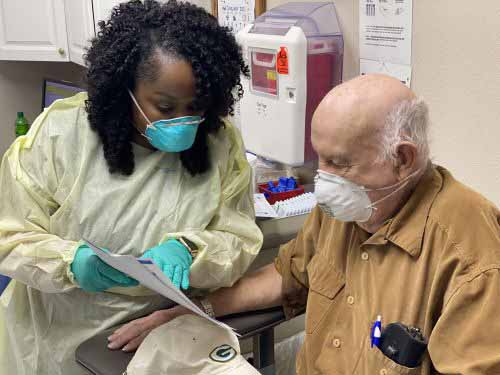In the Spotlight
Get the Most Out of Your Visit
Bring these questions to your next appointment

Have you ever left your doctor's appointment and realized you forgot to mention a symptom or ask a question? Health care appointments are often shorter than we might like, but there are ways to make the most of every visit. You and your health care team (the doctors, nurses, therapists, clinicians) can come away from each appointment feeling more satisfied by following some simple steps.
Come prepared
My HealtheVet makes it easier than ever to come prepared for your health care appointments. Before your visit, sign in and check your prescription records online. Let your health care team know if there are changes to your medications or how you have been taking them. You can also review notes from previous visits with your health care team and recent lab test results. These are conveniently found in your VA Blue Button report.
Speak up
During your visit, be sure to speak up and talk with your health care team as your partners. They are here to help you with your health and care. This means that you need to be involved in your health care decisions and can do things to make your visits more productive. For example, much of the information needed to make a diagnosis is based on your description of symptoms, recent changes, and your health history. Be sure to share this information with your provider during your visit. Download and print out your VA Blue Button report from My HealtheVet and take it with you to your appointment. You can use it as a reference, but make sure your information is up-to-date.
What to bring
Be sure to bring all the medications you are taking in their original labeled containers, including any over-the-counter medicines or herbal supplements. Be prepared to describe exactly when, how, and how often you take each of these, and any side effects you may have noticed.
Bring a written list of any changes you have noticed in your health. Include symptoms, any medical history, or other information you think might be helpful for your health care team to know.
Bring a written list of your questions. You might ask:
-
What can I do to stay healthy?
-
What can I do to manage my health problems better?
-
What do my symptoms mean?
-
What is the cause, or why is this happening to me?
-
What are my treatment options?
-
What will the treatments be like?
-
How will these treatments make me feel?
-
What do you recommend I do?
-
Where can I get help if I need it?
-
How can I find out more information about my condition?
Also, it's a good idea to bring a pen and pad of paper so you can write down the answers to your questions. You may want to bring a friend or family member with you to help you remember the answers to your questions or other details of the visit.
Get involved
Speak up! Don't be afraid to ask questions of your provider or others on your health care team; they are there to help you, and they appreciate you being involved in your care.
-
Tell your health care provider right upfront what you want to get done at this visit.
-
Bring a written list.
-
Early in your visit, describe any pain, symptoms, or side-effects you have been having.
-
Talk about your concerns and worries you have about your health. Don't wait until the end of the visit to mention important concerns or symptoms.
Tell the truth, even if it's embarrassing. Your health care team needs to know the full picture. Share any personal concerns like sexual problems or trouble controlling your bladder or bowels. Your health care team understands those things and wants to help.
-
Be sure to ask questions. If you have trouble understanding what members of your health care team are saying, ask for a more straightforward explanation, speak more slowly, speak louder or softer, draw a picture, or whatever else would help you understand.
-
Ask about your treatment or care plan so you understand it, know what to expect, and what the next steps are.
-
Ask for written instructions and information if it's available.
Remember: about five days after your visit, you can sign in to your My HealtheVet account and read your provider's visit notes using your Blue Button report. If you have any follow-up questions or concerns, you can easily send a Secure Message (sign in required) to your health care team.
Using these tips to get involved in your health care can help you and your health care team act as partners. They are all working together to improve your health and keep you healthy. Your health may be your most valuable asset, so be sure to protect it.
Please vote in our unscientific poll. All responses are anonymous.
Read More
VA Notes: Better Understanding, Better Care
Be Involved in Your Health Care (Veterans Health Library)
Questions To Ask Your Doctor (HHS/AHRQ)
Updated January 26, 2021
